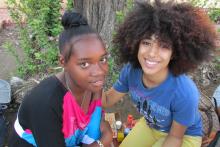Afro-Descendant and Indigenous Peoples in the Americas
This research action project focuses on historical and contemporary issues of concern to Afro-Descendant and Indigenous Peoples of Latin America and the Caribbean, whether living in their homeland or in diaspora throughout the Americas. The RAP includes artists and scholars interested in bringing attention to such issues through collaboration with these Afro-descendant and indigenous communities.
AY 2016-17: Reports from RAP members
Report from Alaí Reyes-Santos and Ana-Maurine Laura: “Decolonizing Knowledge: Afro-Indigenous Women Healers in the Caribbean and Its Diasporas”
Report from Juan Eduardo “Ed” Wolf: This past April, two Afro-Chilean activists visited the University of Oregon campus. Azeneth Baez Rios and her nephew, Cristian Baez Lazcano, have both been part of the movement pushing to have the Chilean government formally recognize the Afro-descendant presence with the country. While Chile’s government passed the so-called 1993 “Ley Indigena,” a law that acknowledged the existence of nine Indigenous groups within the country, it has refused to include a category allowing individuals to identify as Black or Afro-descendant on its census. Chile is the only country remaining in Latin America that does not allow people to identify in this way.

Azeneth and Cristian were visiting the U of O to present individual talks as part of the second annual LALISA conference, a meeting of members and guests of the Latin American, Latino, and Iberian Studies Association of the Pacific Northwest. Cristian, who is general coordinator of the organization Lumbanga and was recognized in 2006 as among the top 100 young leaders in Chile, spoke on the history of the formation of Afro-descendant organizations in Chile and how the Chilean government has rejected their efforts over the last decade to be reported on the census. Azeneth, who heads the Association of Rural Afro-descendant Women “Daughters of Azapa,” discussed the important of women’s oral histories to the movement. Both talks were delivered in Spanish and are available on the “Lumbanga de Arica” YouTube channel.
The conference had the support of CLLAS, LAS, and the University of Oregon itself. The activists were sponsored by UO assistant professor of ethnomusicology Juan Eduardo Wolf, who also works with the CLLAS Afro-descendant and Indigenous Issues RAP. Juan Eduardo met the activists as part of his research into the use of music and dance in the Chilean Afro-descendant community, both as part of the movement and in their daily lives. His LALISA talk focused on this subject, a portion of his book manuscript Afro-Chile?! Styling Blackness in Music-Dance within the African Diaspora.
In addition to conference participation at the University of Oregon, the activists met with faculty, visited classes, and attended the closing conference concert of Afro-Peruvian music. Then they rushed back to Chile to be able to participate in the 2017 campaign to encourage Afro-descendants to identify themselves as Afro-descendants in an irregular way in that year’s census. The final results of that campaign are still unknown, but their efforts have had some impact. In September this year, their local congressman was able to get a bill that would recognize their status slated on the legislative agenda for discussion. For more information, visit https://www.camara.cl/prensa/noticias_detalle.aspx?prmid=131757.
AY 2015-16
During Winter and Spring 2016 quarters, the Research Action Project on Afro-descendant and Indigenous Issues organized a Works-In-Progress Series. Professors from the University of Oregon and Portland State University presented drafts of their current research and received feedback from peers. Topics included everyday experiences of racism in Latin America, Mam refugees and gender violence, styles of Blackness in Chilean border music, and Nature being given legal rights in Ecuador. The sessions were generally well attended, with participation from the public in the Q & A.

In AY 2014-15
RAP members led by Alai Reyes-Santos (Ethnic Studies), helped coordinate an exhibition of photographs taken by activists in the Dominican Republic that helped focus on the stateless situation of Black Dominicans of Haitian descent (see description of Reconoci.do in Archived RAP Projects). This year, we are supporting a Works-In-Progress series of lectures in the hopes of growing this community of researchers and scholars engaging the social, political, historical, and cultural experiences of Latin@ and Latin American indigenous and Afro-descendant communities.
Project Coordinator: Juan Eduardo “Ed” Wolf, Assistant Professor, Ethnomusicology, UO School of Music and Dance
